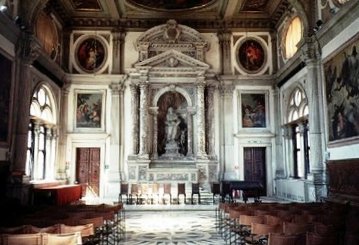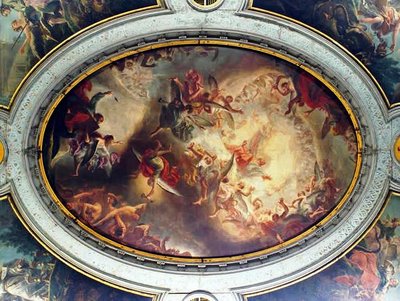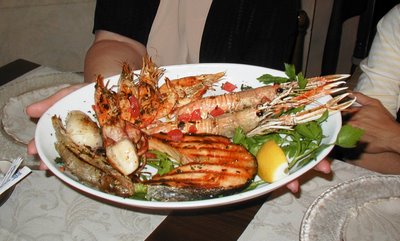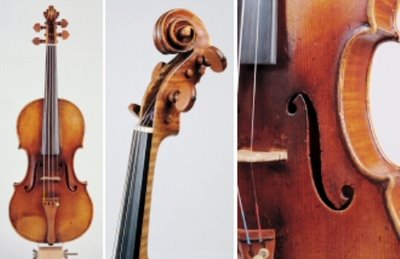Opera. The drama doesn't end with curtain call.
In Venice, our opera experience was a small and fairly intimate event held in a 15th century church. 
This church is part of a school founded in 1261, Scuola Grande di San Giovanni Evangelista. It was renovated in the 1600s, and has been an art museum since (I believe.) It's chock full of incredible works of art, even by Venetian standards: statues, tapestries and paintings created by the likes of Tintoretto, Veronese, Tiepolo and other giants. (More images of the Scuola's treasures here.)
This was the ceiling.
The performance was by Musica in Maschera, a fine 8-piece chamber ensemble with a soprano and tenor, and a ballet dancer, performing in authentic 17th century Venetian costumes and masks. All were fine performers, but honestly, the dancer had so little room to maneuver at the front of the church that she ended up looking ridiculous. The musicians were great, helped out by the fabulous acoustics of the building.
So it was a concert performance. Where's the drama?
OFF STAGE.
The singers, for the most part, took turns to sing at the front of the church. When he was not "on," the tenor, a thirty-something in fine voice, was carrying on with his much-younger girlfriend seated in the audience. My friends told me they were actually making out between arias!! And this was a church, mind you.
Now the drama begins.
After the enjoyable evening, our group walked through the little alleys towards the Rialto. Suddenly, we we heard an approaching commotion and saw the tenor, now out of costume, running towards us as fast as his legs would carry him, casting glances backwards as he pushed past us.
A few seconds later we saw what he was running from - his girlfriend, with a look on her face that would turn Medusa's blood cold. Just as she passed us her beau went over a bridge and out of sight. With a heartfelt snort and a look of absolute fury, she abandoned the chase, threw up her hands in disgust and stomped her way toward the canal.
I'd pay good money to find out what happened when she caught up with the tenor.
Is he singing castrato now?
This is the audio spot I sent from Venice on this incident.
Gillian Coldsnow


